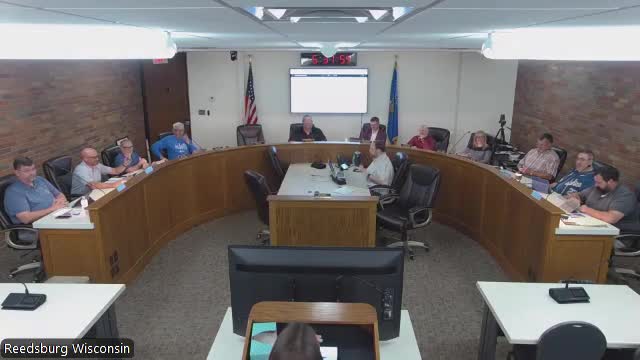City auditor reports $1.1 million net increase in general fund; warns on TID advances and debt levels
October 13, 2025 | Reedsburg, Sauk County, Wisconsin
This article was created by AI summarizing key points discussed. AI makes mistakes, so for full details and context, please refer to the video of the full meeting. Please report any errors so we can fix them. Report an error »

Amanda Blomberg, an auditor with Baker Tilly, told the Reedsburg Common Council that the city’s 2024 financial statements show a net increase in the general fund of about $1,100,000, largely driven by a reimbursement tied to ambulance costs.
Blomberg said the general fund is “the main operating fund of the city.” She told the council that about $1,000,000 of the $1.1 million increase was a repayment identified in 2024 that moved from the Capital Projects Fund into the general fund to reimburse ambulance-related costs; excluding that repayment, the general fund increase was roughly $137,000.
The audit presentation broke the general fund balance into categories by liquidity and identified advances the general fund made to other funds. Blomberg said Tax Increment District 9 (TID 9) accounted for a large advance from the general fund, which she described as the “big culprit” for growth in nonspendable balances.
Blomberg summarized the city’s general-obligation (G.O.) debt and debt-service metrics. She said the city had about $24,800,000 in G.O. debt at year-end 2024 and the utilities held about $10,600,000. In 2024 the city was at about 71% of its G.O. debt capacity; Blomberg noted that while that percentage is high, annual debt-service costs were relatively low — roughly 10% of noncapital annual expenditures, which she characterized as “pretty good.”
On fund-balance policy, Blomberg said the city’s target is roughly 25–30% of annual expenditures; she noted the 2024 unassigned fund balance declined and recommended monitoring advances and future budgets to avoid falling “significantly lower.” “What I would recommend here, though, is… making sure we're monitoring this,” Blomberg said.
Council members asked staff clarifying questions about which funds paid for specific purchases and where particular expenses had been budgeted. Blomberg noted some capital and nonoperating transactions (advances and TID spending) were the principal drivers of category changes in fund balance and recommended attention to the timing of repayments and future borrowing decisions.
The presentation was informational; no formal council action or vote was taken on the audit at this meeting. The council thanked the auditor and moved on to the next agenda item.
Blomberg said the general fund is “the main operating fund of the city.” She told the council that about $1,000,000 of the $1.1 million increase was a repayment identified in 2024 that moved from the Capital Projects Fund into the general fund to reimburse ambulance-related costs; excluding that repayment, the general fund increase was roughly $137,000.
The audit presentation broke the general fund balance into categories by liquidity and identified advances the general fund made to other funds. Blomberg said Tax Increment District 9 (TID 9) accounted for a large advance from the general fund, which she described as the “big culprit” for growth in nonspendable balances.
Blomberg summarized the city’s general-obligation (G.O.) debt and debt-service metrics. She said the city had about $24,800,000 in G.O. debt at year-end 2024 and the utilities held about $10,600,000. In 2024 the city was at about 71% of its G.O. debt capacity; Blomberg noted that while that percentage is high, annual debt-service costs were relatively low — roughly 10% of noncapital annual expenditures, which she characterized as “pretty good.”
On fund-balance policy, Blomberg said the city’s target is roughly 25–30% of annual expenditures; she noted the 2024 unassigned fund balance declined and recommended monitoring advances and future budgets to avoid falling “significantly lower.” “What I would recommend here, though, is… making sure we're monitoring this,” Blomberg said.
Council members asked staff clarifying questions about which funds paid for specific purchases and where particular expenses had been budgeted. Blomberg noted some capital and nonoperating transactions (advances and TID spending) were the principal drivers of category changes in fund balance and recommended attention to the timing of repayments and future borrowing decisions.
The presentation was informational; no formal council action or vote was taken on the audit at this meeting. The council thanked the auditor and moved on to the next agenda item.
View full meeting
This article is based on a recent meeting—watch the full video and explore the complete transcript for deeper insights into the discussion.
View full meeting
